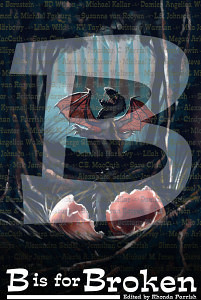 For the next several weeks I’ve decided to call Fridays ‘Fractured Friday’ and use them to share news, contributor interviews and excerpts from B is for Broken.
For the next several weeks I’ve decided to call Fridays ‘Fractured Friday’ and use them to share news, contributor interviews and excerpts from B is for Broken.
B is for Broken is the second title in the Alphabet Anthologies series. It follows A is for Apocalypse and will in turn be followed by C is for Chimera. Each story in the series is associated with a letter of the alphabet and is titled in the letter is for word format. What’s more, just to keep things nice and complicated, the story’s title isn’t shared at the beginning but at the end so that you can guess at what it might be while you read.
On that note, even though the story titles could be considered spoilers because of how the book is formatted, for the sake of simplicity if the author has chosen to post their title publicly somewhere else (their blog, Facebook, wherever) I am going to include it in my posts. If they haven’t revealed that information, though, I’ll list the story titles as Letter is for…
With twenty-six stories and twenty-seven contributors I ought to have plenty of material for loads of Fractured Fridays to come. And you might think I’d have a difficult time deciding where to start but it took me far longer to come up with a broken-themed alliteration than it did to pick what to post first. It had to be C.S. MacCath’s interview.
Ceallaigh’s novelette, C is for Change really anchors this anthology. In part that’s because it’s twice as long as the next longest story in this collection but it’s also because of how just straight-up awesome it is. C is for Change addresses the theme of broken on several levels while tackling some really big issues, building a magical new world and introducing us to incredibly three-dimensional characters. I can’t say enough good things about this story, I freaking love it! Check out the excerpt in Ceallaigh’s interview below and you’ll get a sense of why 🙂
Interview with C.S. MacCath
What letter were you assigned?
C
Please share a short excerpt from your story:
“Three nights, maybe less,” I told the man; a grandchild clinging to his neck, another clutching a trouser leg and watched his mouth fall slack with fear. “And we can only make ten trips up the mountain a day, for people and supplies, both. So the Kandunar Warmaster wants you to run, if you can.” The terrified silence of the crowd broke like window glass, and a torrent of questions began to pour through. I gripped the folds of my robe, novitiate blue, and wished for the authority of white. “There’s a ferry at the river mouth that can take you across to the islands…”
“The Vele can swim!” This from the pot-bellied farmer who supplied our potatoes. Andu…Ando… I had only met the man a few weeks ago. Nervous hands twisted the reins of the gelding beneath him.
“Yes, but the Muto Vele cannot,” I assured him. “They forget everything but violence when the Muto Qeyunar fix them into mounts. Andro, take your horse and go. Don’t leave him to wander in the place this valley is about to become.”
A middle-aged woman stepped onto the lip of the lift, and it rocked into the cliffside with a crunch. A speckled chicken clucked from the crook of her arm. She kissed the crimson comb of its head and declared, “Henny hates to see people fight.” Her tunic and trousers, too fine for the fetor of her flesh and the cluster of lice in her bushy red hair, were streaked with greasy bird droppings. “Something happens inside, and she can’t control it.”
“Why does she get to go up first?” A pregnant woman pointed her belly at the lift as if to assert her claim to a place aboard. “We’ve got little ones and old peo…”
“How would a twiggy boy like you know what the Muto Vele can do?” Andro interrupted again, his voice cracking over the question. The gelding whinnied and shied.
This was authority – and shame – I possessed in abundance, and they could only be wielded together. With a shrug, the heavy sleeves of my robe fell to the sash at my waist. Andro stammered a prayer, and a few in the crowd cried out, but the middle-aged woman spread her fingers and traced the trenches of blackened scar across my chest from shoulder to hip.
“The claws,” she murmured, her touch warm and unflinching. “They cut through everything, like a folded blade.” Her eyes followed the sheer face of the mountain into the low-hanging clouds. “We might not be safe up there.”
What is the thing you’ve most regretted breaking?
A promise to myself that I would move to Ireland and make my home there someday. Then again, I’m not dead yet, so that path might still lie ahead of me.
Have you ever broken something and not been saddened by it? Can you tell us about that?
I burned two Clarion 2006 tee shirts in a Samhain (Halloween) bonfire a couple of years ago along with a box of items that represented negative experiences from which I wished to be cleansed. They made a lovely fire.
If you could break one law and get away with it consequence-free, what would it be?
Grand larceny, but then I’d also have to wear a leather jerkin and live in a Renaissance Faire village so I could be the thief my Skyrim character wishes I was.
Do you have any rules for yourself, a code of some sort, which you’d never break?
I’m vegan, so I oppose the exploitation of animals for medicine, food, clothing, entertainment and other purposes.
Never ever?
No ethical position is perfect, and there are many situations where it isn’t practicable to be vegan. For instance, there are animal ingredients in automobile tires and other ubiquitous household items. That said, I make a conscious effort to avoid these things wherever possible.
Really? Isn’t there something which could make you break it?
If my life were at stake, yes, I would absolutely take the life of another sentient being. However, I should stress that this hypothetical situation would be an extreme one where there was no other option but to take that life or give up my own.
Did you struggle with the letter you were assigned, or did the ideas come freely?
This story fell out of me like a long-held confession, and I love it with all my heart.
What was your favourite idea you didn’t use?
I wrote a 13,000-word story. I solemnly promise you that I used each and every one of my favourite ideas.
What, aside from the anthology’s theme and your letter inspired your story?
A few years ago, I met a man at Canadian Tire in Nova Scotia who had a service dog with him. I asked if I could pet the dog, and he said that I could. We struck up a conversation, and I learned he was a former Canadian soldier suffering from PTSD. He volunteered a great deal about his illness; how he came to suffer from it, the limitations it placed upon him emotionally, and the way it affected his marriage. It was as if all the usual shields we put up between ourselves and strangers were missing in him, and he knew it, and he chose to go about in the world a shieldless ambassador for other soldiers suffering from PTSD.
He was a good one. We must have talked for two hours; I was waiting on a car repair, so he and the dog sat with me. I never saw him again after that day, and I don’t even remember his name, but I’ve never forgotten what he shared with me. So while I’m not and never have been a soldier, and while I don’t think my story remotely conveys the brokenness or the resilience I saw in that man, I hope it respectfully illuminates (however faintly) the issue of PTSD among soldiers and first responders.
 C.S. MACCATH is a writer of fiction, non-fiction and poetry whose work has appeared in Strange Horizons, Clockwork Phoenix: Tales of Beauty and Strangeness, Mythic Delirium, Murky Depths, Witches & Pagans and other publications. Her poetry has been nominated twice for the Rhysling Award, her fiction has been nominated for the Pushcart Prize and it has also received honorable mention in The Year’s Best Science Fiction: Twenty-Sixth Annual Collection. You can find her online at csmaccath.com.
C.S. MACCATH is a writer of fiction, non-fiction and poetry whose work has appeared in Strange Horizons, Clockwork Phoenix: Tales of Beauty and Strangeness, Mythic Delirium, Murky Depths, Witches & Pagans and other publications. Her poetry has been nominated twice for the Rhysling Award, her fiction has been nominated for the Pushcart Prize and it has also received honorable mention in The Year’s Best Science Fiction: Twenty-Sixth Annual Collection. You can find her online at csmaccath.com.
~ Twitter ~ Facebook ~ Google+ ~
B is for Broken is available now at:
Smashwords
Kobo
Amazon
Barnes and Noble
And add it to your shelves at Goodreads

